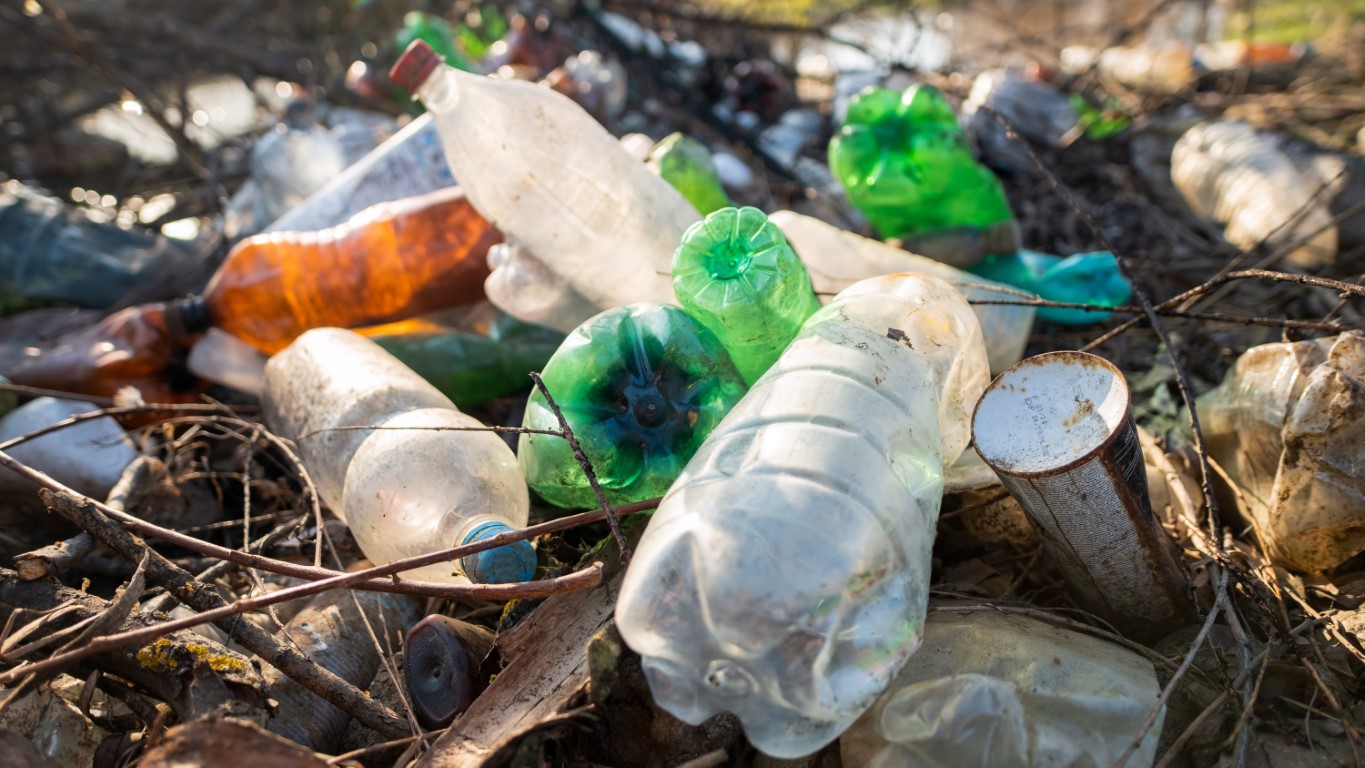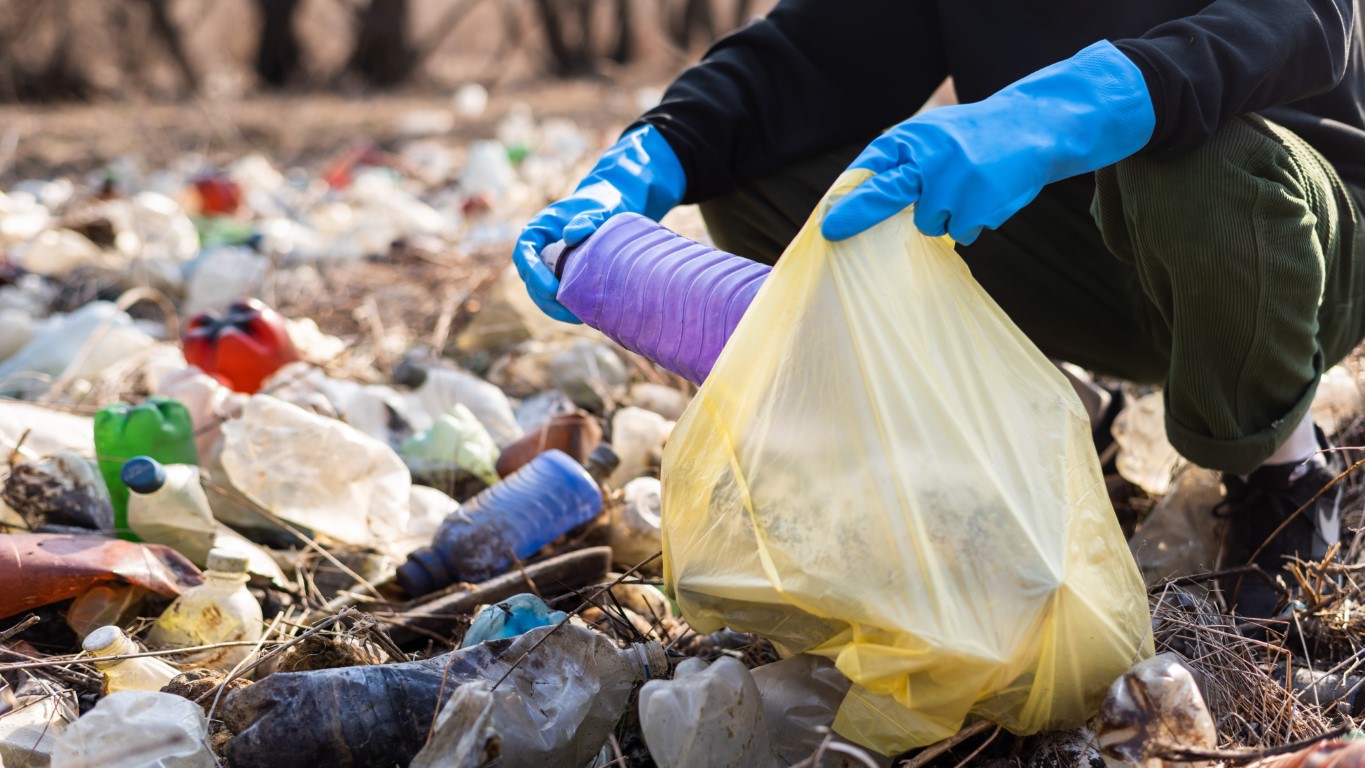As Plastic Pollution Epidemic Grips Nigeria; urgent Action Needed to Safeguard the Environment and Health
As the sun rises over the bustling cities of Nigeria, it reveals a sobering reality – plastic waste strewn across streets, parks, and water bodies. This eyesore, however, is not unique to Nigeria alone; the world grapples with an escalating plastic pollution crisis that threatens both environment and health. A recent report by the United Nations Environment Programme (UNEP) paints a grim picture: a staggering 400 million tonnes of plastic are manufactured annually, with nearly 50 percent designed for single-use purposes.
In this global catastrophe, recycling is a mere afterthought, as less than 10 percent of plastic waste is recycled, leaving 19-23 million tonnes to infiltrate rivers, lakes, and oceans annually. The repercussions are severe, ranging from suffocating landfills to poisoned oceans, and from toxic fumes released during incineration to microscopic plastic particles that invade our food, water, and even the very air we breathe, introducing hazardous additives into our bodies.
Yet, amid the crisis lies a glimmer of hope. The dire reality has sparked both public and political outcry, compelling governments, corporations, and stakeholders to take decisive measures. Nigeria, in particular, grapples with the plastic pollution challenge in unique ways.

Lagos: Battleground of Plastic Waste
Lagos, the throbbing heart of Nigeria, pulses with life and industry. However, beneath the surface, it is entangled in a daily struggle against its own waste. A staggering 13,000 to 15,000 tonnes of waste is generated daily in this megacity, of which a significant 2,250 tonnes are plastic waste. The ubiquitous plastic bag, often used just once, and the proliferation of sachet water consumption – driven by the scarcity of safe drinking water – combine to yield an alarming 2.5 million tonnes of plastic waste annually in Nigeria.
Impact of plastic waste
The impact of plastic waste transcends human inconvenience. As aquatic animals consume plastic, their digestive systems and windpipes become blocked, compromising their health and, in many cases, leading to death. The aquatic world, already vulnerable, is further burdened as creatures become entangled in plastic waste, leading to malnutrition and mortality in that ecosystem. Beyond the direct ecological toll, the unsightly waste defaces Nigeria’s landscapes and aquatic ecosystems, affecting cultural services such as ecotourism.
Also, during a research carried out by Emmanuel Akindele of Obafemi Awolowo University using snails from the Osun River in southwest Nigeria as biological indicators of plastic pollution. In the course of the research, it was discovered that Snails in the river had consumed polyethylene plastic bags, which were common along riverbanks.
“We have also found plastic polymers such as polyester, polypropylene, acrylonitrile butadiene styrene, styrene-ethylene butylene styrene, and chlorinated polyethylene in the Osun and Ogun Rivers.
“The plastic polymers recorded in our study are traceable to different sources such as textiles, biscuit wrappers, automotive tyre cords, bottle caps, and drinking straws. We also saw larger items in the rivers, such as tyres, plastic bags and plastic bottles,” he said.
Akindele concluded by stressing that such plastics could affect the life history, survival, growth and development of insect larvae into adults.
Consequences for Climate Change
The implications of plastic pollution intertwine with the looming threat of climate change. Tackling this issue assumes paramount importance in the global effort to secure a stable climate future.
Plastic pollution is not just an environmental dilemma; it is a visible indicator of human activity. The picturesque beaches, once pristine, now bear witness to plastic waste, symbolizing our collective negligence. The consequences are far-reaching; plastic waste obstructs water flow, exacerbating flooding, compromising biodiversity, and undermining livelihoods.
Challenges on the Path to Change
While Nigeria takes strides to address plastic pollution, formidable obstacles stand in the way. The proliferation of single-use plastics, notably sachet water, coupled with inadequate disposal practices, presents a substantial challenge. State-level interventions like the Lagos Waste Management Authority (LAWMA) signify progress, yet these measures only scratch the surface of a more complex issue. The challenges span ingrained consumer behavior, lack of waste management infrastructure, and businesses entrenched in plastic packaging practices.
Our Recommended Solutions
To surmount Nigeria’s plastic pollution crisis, multifaceted solutions are imperative. Overhauling waste management practices is a cornerstone, with stakeholders emphasizing the need for consumer education with regards waste disposition.
At different fora, Stakeholders in the plastic recycling sectors have emphasised the importance of positive consumer behaviour towards waste disposal if the problem of plastic pollution is to be resolved in the country. Furthermore, instituting a ban on single-use plastics holds promise. The plastic ban bill introduced by Nigeria’s House of Representatives in 2019 signifies progress, yet its transformation into law necessitates sustained political commitment.
The ban of single-use plastic by the government could also be a crucial step for the introduction of a multiuse packaging for sachet water.
Furthermore, businesses must be compelled to abandon the practice of distributing free plastic bags, with governments imposing substantial levies on each bag. These bags are often discarded after a single use. Encouraging alternatives such as paper bags can mitigate plastic waste. Equally pivotal is public education centered on the three Rs: reducing, recycling, and reusing plastic materials. The proliferation of water sachets and bottles as a response to water scarcity mandates targeted efforts to promote access to clean water and instill a sense of responsibility in waste disposal.
As nations like Kenya, Uganda, and Tanzania take proactive steps against plastic pollution, Nigeria mustn’t lag behind. Citizens and leaders bear the collective responsibility of preserving an environment that future generations can inherit with pride. The anticipated “plastic pollution bill” must materialize into law to facilitate effective change. The urgency to combat plastic pollution is not a choice; it’s an imperative that Nigeria cannot afford to postpone.


One Response
*FROM EDUCATIONALLY DISADVANTAGED STATES TO EDUCATIONALLY DISADVANTAGED JUDGES HEADING EDUCATIONALLY DISADVANTAGED COURTS*
Today in Nigeria, issues of Presidential Elections petitions revolve around the credibility question which hoods those lawyers from EDUCATIONALLY DISADVANTAGED STATES that eventually became judges in our courts! We have even seen a head of the judiciary in Nigeria whose academic records qualifying him for the position points to Islamic Studies and not to Law!
So the question is, How can an educationally stunted candidate admitted into the university on such merit understand law very well, especially under the maze called ‘The Nigerian Legal System’? How can a judge who was admitted into a Faculty Of Law based only on Quota System(a waiver on Merit) understand and apply the rigorous principles of Law and freely actually apply it dispassionately without looking for another educationally disadvantaged person in court to rescue irrespective of whatever is the righteous opinion of Law?
It is trite that educationally disadvantaged persons have found their way into high offices in the land, and lord it over a nation of Educationally Advantaged and very sophisticated intellectuals.
Arguments of very powerful mediocres have supported these glitches in our educational system, politics and other areas of our national life, thus hindering desired development of the country! Their workforce, having been forcefully injected into the establishment by the syndicate-in-charge is the reason for the corruption and replete mistakes that bedevil smooth capturing of international passport seekers’ details, and proper recording of simple things like NIN. Some have lost a lot of money travelling from one part of the country to Abuja in a bid to correct ‘educationally disadvantaged mistakes’ that can be corrected with the phone. Some have been maimed by accidents trying to effect such corrections, while others have lost their lives.
In the present, what is before Nigerians is that *educationally disadvantaged personnel* today mann the courts and force law toxins down the throat of Nigerians. Imagine senior advocates and justices who were admitted into law by JAMB with a score of 160 out a total of 400 now exercising authority and power over candidates, even candidates fresh from Civil War, who scored 266, 277, 300 etc, out of 400 in the same JAMB exams! They pose, albeit disdainfully, as teachers and experts in Law, to educationally advanced minds!!
Outside the courts, and this time in the banking sector, over 380 persons of an ethnic group close to highly placed persons in government were recruited into the Central Bank in just one morning. That was immediately after the swearing-in of Presideath Muhammadu Buhari in 2015. Since then, commercial bank tellers have variously been surcharged what Central Bank calls “CBN SHORTAGE”. They always claim that after their *educationally disadvantaged personnel* normally employed without due process had counted all such cash lodged in by the *educationally advantaged commercial Bank staff* they discovered so-and-so amount as shortage and normally mandates the commercial Bank workers to pay up! Commercial Bank staff have been suffering this fraud being perpetrated by CBN and have been paying from their meagre salaries all this while. Don’t forget that most commercial Bank tellers are casual staff employed by Job Scouts. Some of them earn as low as #1,200 a day! If they fail to contribute and pay the amount required by CBN promptly, they lose their jobs! Who will they complain to? Buhari presided over all this!! PAINFULLY HOWEVER, THIS EVIL IS STILL ON !!!
What a country to be part of!!!
+god’sfriendazubikenwobodo,unn